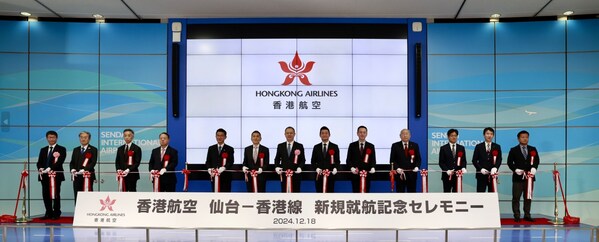Macao breaks new ground in practice of “one country, two systems”
BEIJING, Dec. 18, 2024 /PRNewswire/ — A report from People’s Daily: Over the past 25 years since Macao’s return to China, the practice of “one country, two systems” with Macao characteristics has achieved remarkable success, thanks to the Chinese central government’s strong support and the continuous efforts made by the Macao Special Administrative Region (SAR) government and all sectors of society.
Under the “one country, two systems” framework, Macao has made remarkable strides in politics, economy, improvement of people’s livelihoods, and regional development, with increasing international influence.
“One country, two systems” is an unprecedented innovation. Since Macao’s return to China, chief executives in each term and their respective governance teams have been committed to fully and faithfully implementing this fundamental principle.
The institutional framework supporting the implementation of the Constitution and the Basic Law of the Macao SAR has been continuously refined to ensure the effective functioning of the SAR’s constitutional order.
Macao’s practice of “one country, two systems” is consistently based on an accurate understanding of the guiding principles of the Constitution and the Basic Law, the Chinese central government’s overall jurisdiction, and compliance with the authority of these legal foundations.
Apart from a top-level design and institutional arrangement, “one country, two systems” is also a cornerstone driving Macao’s economic development, livelihood improvement, and social stability.
“We Macao people have deeply felt the benefits of ‘one country, two systems.’ We are both beneficiaries and practitioners of this principle,” said Cheong Chok Man, director of the Policy Research and Regional Development Bureau under the Macao SAR government.
Over the past 25 years, Macao has undergone the fastest development of the highest quality in its history, marked by the strongest sense of fulfillment, happiness and security of the people.
Before Macao returned to China, there was a big economic gap between the SAR and the “Four Asian Tigers,” also known as the “small dragon” economies of East Asia. Back then, the per capita GDP of Macao ranked only around 40th in the world.
Thanks to the comprehensive and targeted implementation of “one country, two systems,” the tremendous opportunities brought by the rapid development of the Chinese mainland, and the concerted efforts of the Macao SAR government and all sectors of society, Macao has experienced an amazing transformation and achieved remarkable progress in economic and social development that has attracted worldwide attention.
By the end of September 2024, Macao’s fiscal reserves had amounted to 617 billion patacas ($77.04 billion), and foreign exchange reserves had reached 230.6 billion patacas.
With the support of the Chinese central government, Macao has seen a larger space for development.
In December 2015, the Chinese central government approved Macao’s land reclamation plans and granted it administration over 85 square kilometers of surrounding waters, to align with its land area of 33.3 square kilometers. It also launched a general plan for developing the Macao SAR to improve the living environment, develop marine tourism, and promote regional cooperation.
In 2021, the Guangdong-Macao In-Depth Cooperation Zone was established to deepen collaboration between Macao and south China’s Guangdong province. The zone, on the island of Hengqin in Zhuhai, Guangdong, which covers an area of 106.46 square meters, has further expanded the development space of Macao to 224.76 square meters.
The establishment of the cooperation zone also marked the beginning of a new management mechanism that features mutual discussion, joint construction, joint administration and shared benefits between Macao and Guangdong.
Since its return to China, Macao has experienced a continuous expansion of institutional and policy space.
In September 2021, China’s central authorities issued a general plan for building the Guangdong–Macao in-depth cooperation zone in Hengqin, mapping out a blueprint for the cooperation zone.
In December 2022, the “northbound travel for Macao vehicles” scheme was officially implemented, which allows eligible Macao private cars to travel between Macao and Guangdong via the Hong Kong-Zhuhai-Macao Bridge without the need to obtain regular quotas.
In December 2023, China’s State Council approved an overall development plan for the Guangdong–Macao in-depth cooperation zone, which specified the development blueprint and guiding principles for the next 10 to 15 years.
Since this year, a range of measures have been taken successively to foster a closer connection between Macao and the Chinese mainland.
In March this year, Hengqin started a new customs operation that allows most goods to be moved there tax-free from the neighboring Macao SAR; two months later, six policy measures were implemented to provide greater convenience for Chinese mainland residents who come to Macao for business, exhibitions, medical treatment, or art activities.
Starting from July, non-Chinese permanent residents of the Macao SAR are eligible to apply for special travel permits to enter the Chinese mainland. In November, China’s central government approved new travel policies allowing Zhuhai permanent residents to apply for a “one trip per week” permit for Macao, and enabling permanent residents and residence permit holders in Hengqin to apply for multi-entry permits to Macao.
Over the past 25 years, the Chinese central government has continuously introduced policies and measures, dispatched to Macao professionals in various fields such as science and technology, education, healthcare, and culture, and actively promoted all-round exchanges and cooperation. The Chinese mainland has continuously opened up its vast market to Macao, leading and driving the high-quality economic and social development of the SAR.











